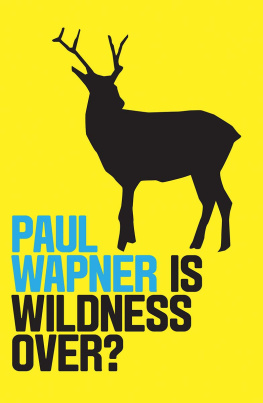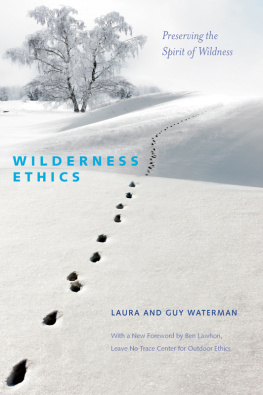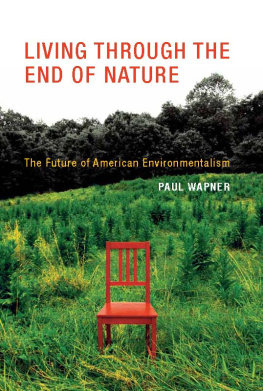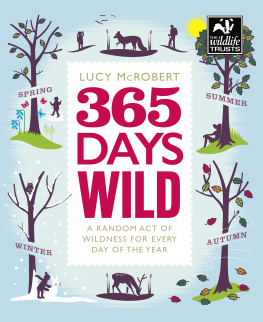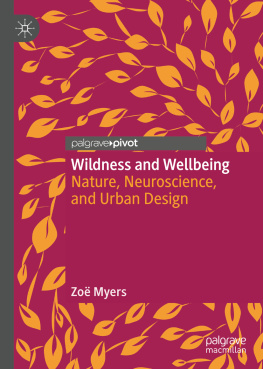Paul Wapner - Is Wildness Over?
Here you can read online Paul Wapner - Is Wildness Over? full text of the book (entire story) in english for free. Download pdf and epub, get meaning, cover and reviews about this ebook. year: 2020, publisher: Polity Press, genre: Politics. Description of the work, (preface) as well as reviews are available. Best literature library LitArk.com created for fans of good reading and offers a wide selection of genres:
Romance novel
Science fiction
Adventure
Detective
Science
History
Home and family
Prose
Art
Politics
Computer
Non-fiction
Religion
Business
Children
Humor
Choose a favorite category and find really read worthwhile books. Enjoy immersion in the world of imagination, feel the emotions of the characters or learn something new for yourself, make an fascinating discovery.
- Book:Is Wildness Over?
- Author:
- Publisher:Polity Press
- Genre:
- Year:2020
- Rating:3 / 5
- Favourites:Add to favourites
- Your mark:
- 60
- 1
- 2
- 3
- 4
- 5
Is Wildness Over?: summary, description and annotation
We offer to read an annotation, description, summary or preface (depends on what the author of the book "Is Wildness Over?" wrote himself). If you haven't found the necessary information about the book — write in the comments, we will try to find it.
Is Wildness Over? — read online for free the complete book (whole text) full work
Below is the text of the book, divided by pages. System saving the place of the last page read, allows you to conveniently read the book "Is Wildness Over?" online for free, without having to search again every time where you left off. Put a bookmark, and you can go to the page where you finished reading at any time.
Font size:
Interval:
Bookmark:
Contents
Is Wildness Over?
Paul Wapner
polity
Copyright Paul Wapner 2020
The right of Paul Wapner to be identified as Author of this Work has been asserted in accordance with the UK Copyright, Designs and Patents Act 1988.
First published in 2020 by Polity Press
Polity Press
65 Bridge Street
Cambridge CB2 1UR, UK
Polity Press
101 Station Landing
Suite 300
Medford, MA 02155, USA
All rights reserved. Except for the quotation of short passages for the purpose of criticism and review, no part of this publication may be reproduced, stored in a retrieval system or transmitted, in any form or by any means, electronic, mechanical, photocopying, recording or otherwise, without the prior permission of the publisher.
ISBN-13: 978-1-5095-3214-8
A catalogue record for this book is available from the British Library.
Library of Congress Cataloging-in-Publication Data
Names: Wapner, Paul Kevin, author.
Title: Is wildness over? / Paul Wapner.
Description: Cambridge ; Medford, MA : Polity, 2020. | Series: Environmental futures | Includes bibliographic references.
Identifiers: LCCN 2019035362 (print) | LCCN 2019035363 (ebook) | ISBN 9781509532117 (hardback) | ISBN 9781509532124 (paperback) | ISBN 9781509532148 (epub)
Subjects: LCSH: Naturalness (Environmental sciences) | Nature conservation--Philosophy. | Environmentalism--Philosophy.
Classification: LCC GE40 .W366 2020 (print) | LCC GE40 (ebook) | DDC 304.2--dc23
LC record available at https://lccn.loc.gov/2019035362
LC ebook record available at https://lccn.loc.gov/2019035363
The publisher has used its best endeavours to ensure that the URLs for external websites referred to in this book are correct and active at the time of going to press. However, the publisher has no responsibility for the websites and can make no guarantee that a site will remain live or that the content is or will remain appropriate.
Every effort has been made to trace all copyright holders, but if any have been overlooked the publisher will be pleased to include any necessary credits in any subsequent reprint or edition.
For further information on Polity, visit our website: politybooks.com
Dedication
To Diane
For honoring my wild aspirations and forgiving my too civilized neuroses
Acknowledgments
This is a thin volume, yet my debt in writing it extends far and wide. I wish to thank Louise Knight of Polity for inviting me to write the book and for her insightful editorial support. I am grateful to Nasruddin Chowdhury, Jessie Mehrhoff, Aimee Seligman, and Bryan Hickel for superb research assistance. Two anonymous reviewers offered incisive, challenging, and productive criticism; the book is far better for their efforts. A summer grant from the School of International Service at American University provided much appreciated research support and my students in the Global Environmental Politics Program consistently challenged me to write with greater purpose. Conversations with the Takoma Park Poetic Skull Sippers and the landscape of Taos, New Mexico served as ideal venues for exploring wildness. A special thanks goes to the Lama Foundation, Association for Contemplative Mind in Higher Education, and EarthLoveGo.org for creating opportunities to share insights from this book. I would also like to acknowledge Richard Falk, my long-term mentor and friend, who has shaped my thoughts in ways beyond expression. Many other dear friends have enriched my life while I was researching and writing the book. I thank them for sharing their warmth and being themselves. My deepest gratitude goes to my family. Mindful of and engaged with the immense challenges facing our world, they demonstrate the amazing power of love.
1
Brave New Wild
Aldo Leopold, begins his classic environmental text A Sand County Almanac by distinguishing two kinds of people. He writes: There are some who can live without wild things, and some who cannot (Leopold, 1989, p. vii). He associates himself with those who cannot. Leopold, who lived from 1887 until 1948, loved the way the world moves on its own. He reveled in watching sunsets, rainstorms, flying geese, and foxes scampering across fresh snow. Encountering wildness, for Leopold, made life worth living. Wildness stands as something beyond human control and comprehension. It excites the mind, exercises the body, and elevates the spirit. Leopold spent his life celebrating wild things and working to protect them.
Leopold was one of the most thoughtful and perceptive environmentalistsa pioneer and visionary of ecology and environmental ethics. His comment about wildness, however, is overly polite. For a person who desperately wanted others to embrace a land ethic and care about the Earth, he makes it seem like wildness is a mere preference. Some just happen to love wild things; others not. This leaves out how political power shapes ones attitude to wildness. Moreover, he overestimates how many people share his love of wildness. Most people, even during Leopolds time, hate wildness. They may like sunsets and a seasons first snow, but they find insects, thunderstorms, remote areas, and predatory animals irritating and often threatening. These things have their own way about them and this otherness can frustrate best-laid plans and prove unnerving in its unpredictability. Far from delight, wildness annoys and threatens. For most people, it is not something to marvel at or be moved by but a source of discomfort, inconvenience, and vulnerability. Over the past few centuries people have gone to great lengths to shove it out of their lives. When Leopold declared his love of wildness, he was a rarityand he remains one today. Most people couldnt care less about wild things. They see well-being in stability and certainty and resist discomfort. The consequence of this, as I will explain, is catastrophic.
For many people, wildness is what we experience when we go into the woods, ascend a mountain, or explore a desert. Wildness, from this perspective, refers to the unwieldy character of the more-than-human world. In the woods, things happen on their ownin a manner that is indifferent and often resistant to human design. As the words etymology suggests, wild things are self-willed. They operate according to their own unique dynamics. For Leopold and fellow conservationists, encountering things that refuse to move to a human beat is a rush; it enlivens life. For most others, however, it spells annoyance and peril.
Wildness goes beyond forests and streams. It also shows up in human affairs. The unpredictability of war, mind-boggling complexities of high technology, and chaotic character of large crowds, for instance, share the element of uncertainty, tempestuousness, and danger. Wildness, in this sense, has to do with the capriciousness of living in a world of others. It denotes the unexpected dynamics that emerge in society and take on a life of their own. It is a state of mind where one loses ones bearings or finds oneself unable to manage circumstances. Some may like the unpredictable dimensions of collective life, just as they like wildness in the woods; most, however, detest it and do what they can to avoid it.
These days, the enemies of wildness have finally triumphed. They have largely realized the dream of ridding their lives of wild things. One sees this most dramatically among the affluent. Today the wealthy live protected from the elements, in secure houses or apartments; they avoid inconveniences by traveling in insulated cars or planes; and they have control over their immediate world through an almost infinite number of appliances. (Including transit, the average American spends over 93% of their time indoors: Klepeis et al., 2001.) Most buy food in a grocery store, draw energy from a plug, drink sanitized water, and flush waste down a toilet or sink. They track weather on cell phones, locate themselves through GPS, and flip a switch to get warmer or turn darkness into light. Many reside in stable regimes ruled by law or possess enough power to be otherwise secure. The most privileged have drivers licenses, medical care, protection from theft, education, and Internet service. Indeed, vast numbers of people today possess extraordinary control over their surroundings and find life more secure and enjoyable in the absence of wildness. To be sure, they still have ups and downs and unpredictable things still happen to them. The havens they have created are not impermeable. But they experience inconvenience and risk in increasingly circumscribed ways. For all intents and purposes, they have locked wildness out of their houses, occupations, and daily affairs. They have sent wildness into hiding. For them, wildness is over.
Next pageFont size:
Interval:
Bookmark:
Similar books «Is Wildness Over?»
Look at similar books to Is Wildness Over?. We have selected literature similar in name and meaning in the hope of providing readers with more options to find new, interesting, not yet read works.
Discussion, reviews of the book Is Wildness Over? and just readers' own opinions. Leave your comments, write what you think about the work, its meaning or the main characters. Specify what exactly you liked and what you didn't like, and why you think so.

